Effective Organizational Communication Strategies for Mr. Fishy
VerifiedAdded on 2021/02/19
|9
|2515
|33
Report
AI Summary
This individual report analyzes organizational communication within the context of Mr. Fishy, a restaurant. It begins with an introduction and abstract, followed by a literature review that explores various perspectives on organizational communication. The report then delves into a descriptive analysis, examining the purpose and principles behind different forms of communication, including formal, informal, and oral communication. It applies principles of effective communication to enhance practices, such as clarity, objectivity, consistency, and completeness. Furthermore, the report evaluates communication practices, including developing communication channels, employee feedback, conflict resolution, and emotional intelligence. Recommendations are provided to improve communication strategies, and the report concludes with a summary of the findings and a list of references. The report highlights the importance of effective communication for achieving organizational goals and fostering a positive work environment at Mr. Fishy.
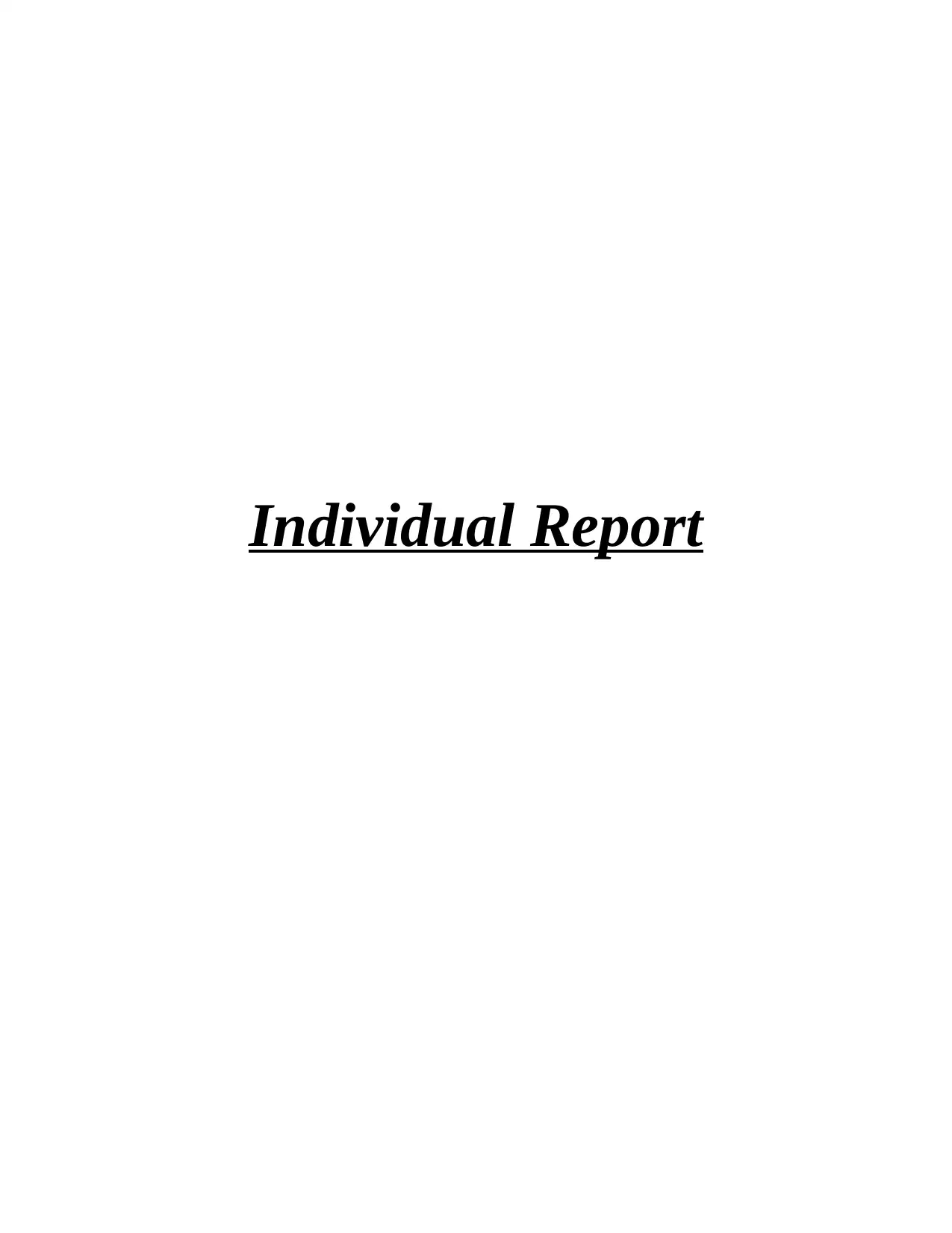
Individual Report
Paraphrase This Document
Need a fresh take? Get an instant paraphrase of this document with our AI Paraphraser
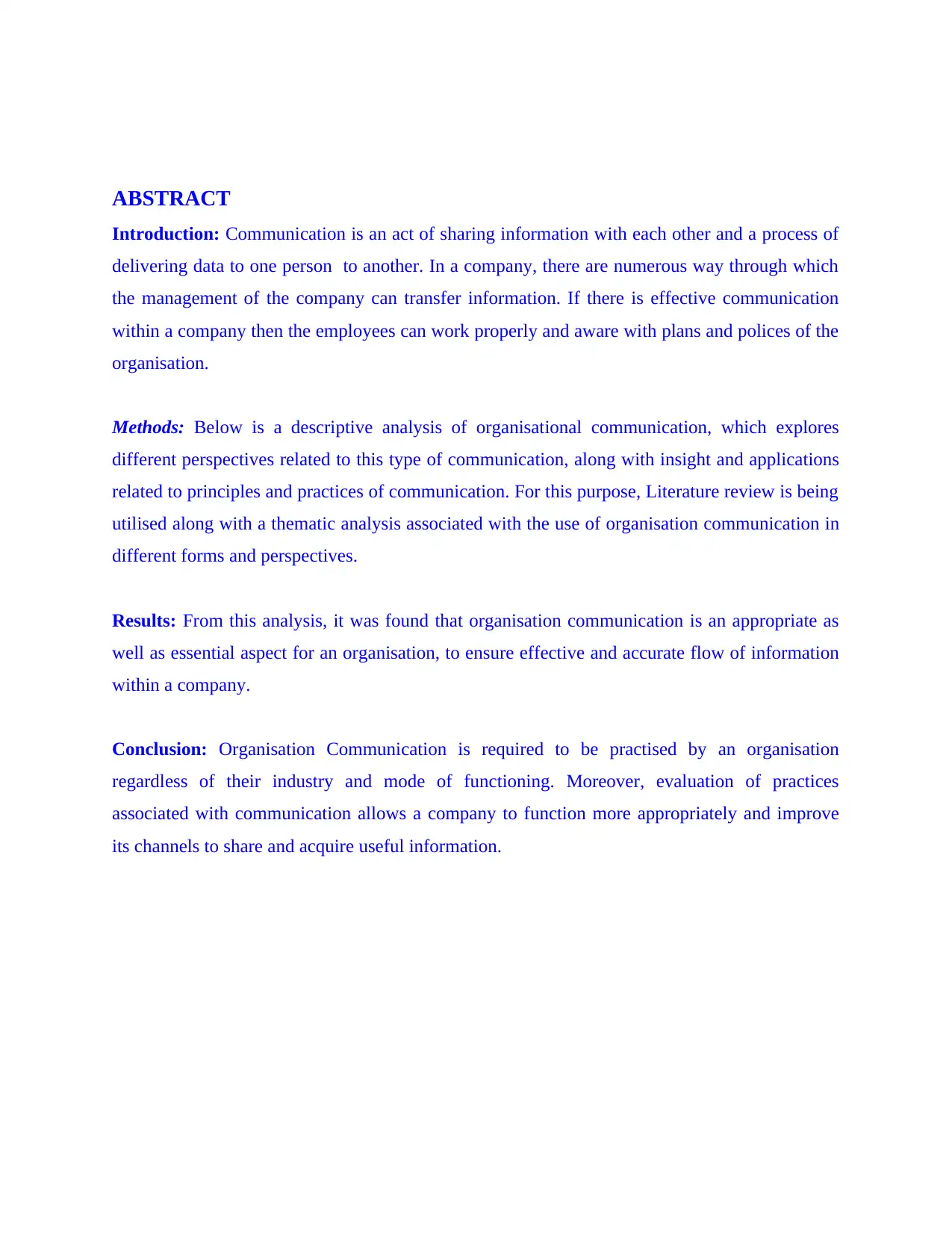
ABSTRACT
Introduction: Communication is an act of sharing information with each other and a process of
delivering data to one person to another. In a company, there are numerous way through which
the management of the company can transfer information. If there is effective communication
within a company then the employees can work properly and aware with plans and polices of the
organisation.
Methods: Below is a descriptive analysis of organisational communication, which explores
different perspectives related to this type of communication, along with insight and applications
related to principles and practices of communication. For this purpose, Literature review is being
utilised along with a thematic analysis associated with the use of organisation communication in
different forms and perspectives.
Results: From this analysis, it was found that organisation communication is an appropriate as
well as essential aspect for an organisation, to ensure effective and accurate flow of information
within a company.
Conclusion: Organisation Communication is required to be practised by an organisation
regardless of their industry and mode of functioning. Moreover, evaluation of practices
associated with communication allows a company to function more appropriately and improve
its channels to share and acquire useful information.
Introduction: Communication is an act of sharing information with each other and a process of
delivering data to one person to another. In a company, there are numerous way through which
the management of the company can transfer information. If there is effective communication
within a company then the employees can work properly and aware with plans and polices of the
organisation.
Methods: Below is a descriptive analysis of organisational communication, which explores
different perspectives related to this type of communication, along with insight and applications
related to principles and practices of communication. For this purpose, Literature review is being
utilised along with a thematic analysis associated with the use of organisation communication in
different forms and perspectives.
Results: From this analysis, it was found that organisation communication is an appropriate as
well as essential aspect for an organisation, to ensure effective and accurate flow of information
within a company.
Conclusion: Organisation Communication is required to be practised by an organisation
regardless of their industry and mode of functioning. Moreover, evaluation of practices
associated with communication allows a company to function more appropriately and improve
its channels to share and acquire useful information.
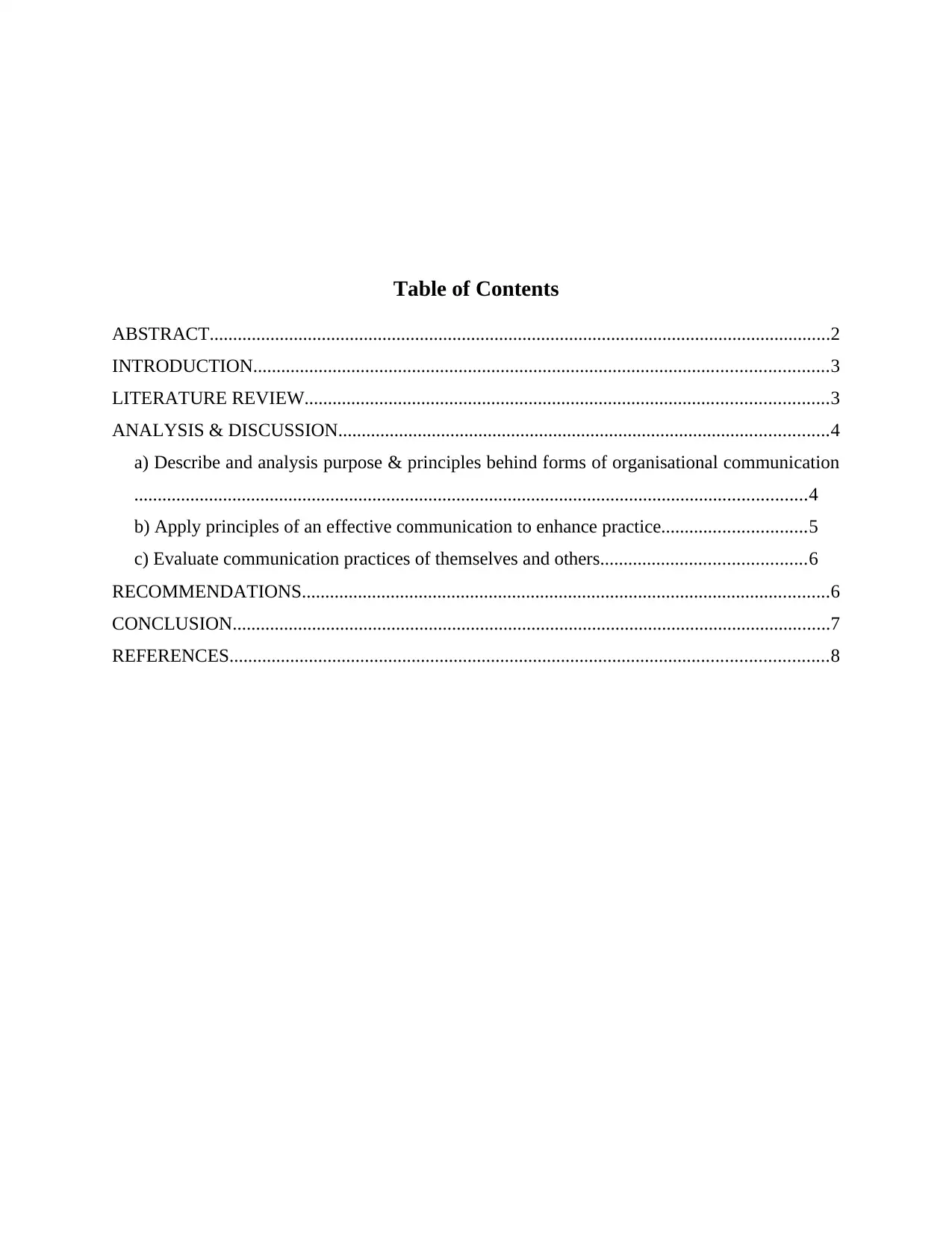
Table of Contents
ABSTRACT.....................................................................................................................................2
INTRODUCTION...........................................................................................................................3
LITERATURE REVIEW................................................................................................................3
ANALYSIS & DISCUSSION.........................................................................................................4
a) Describe and analysis purpose & principles behind forms of organisational communication
................................................................................................................................................4
b) Apply principles of an effective communication to enhance practice...............................5
c) Evaluate communication practices of themselves and others............................................6
RECOMMENDATIONS.................................................................................................................6
CONCLUSION................................................................................................................................7
REFERENCES................................................................................................................................8
ABSTRACT.....................................................................................................................................2
INTRODUCTION...........................................................................................................................3
LITERATURE REVIEW................................................................................................................3
ANALYSIS & DISCUSSION.........................................................................................................4
a) Describe and analysis purpose & principles behind forms of organisational communication
................................................................................................................................................4
b) Apply principles of an effective communication to enhance practice...............................5
c) Evaluate communication practices of themselves and others............................................6
RECOMMENDATIONS.................................................................................................................6
CONCLUSION................................................................................................................................7
REFERENCES................................................................................................................................8
⊘ This is a preview!⊘
Do you want full access?
Subscribe today to unlock all pages.

Trusted by 1+ million students worldwide
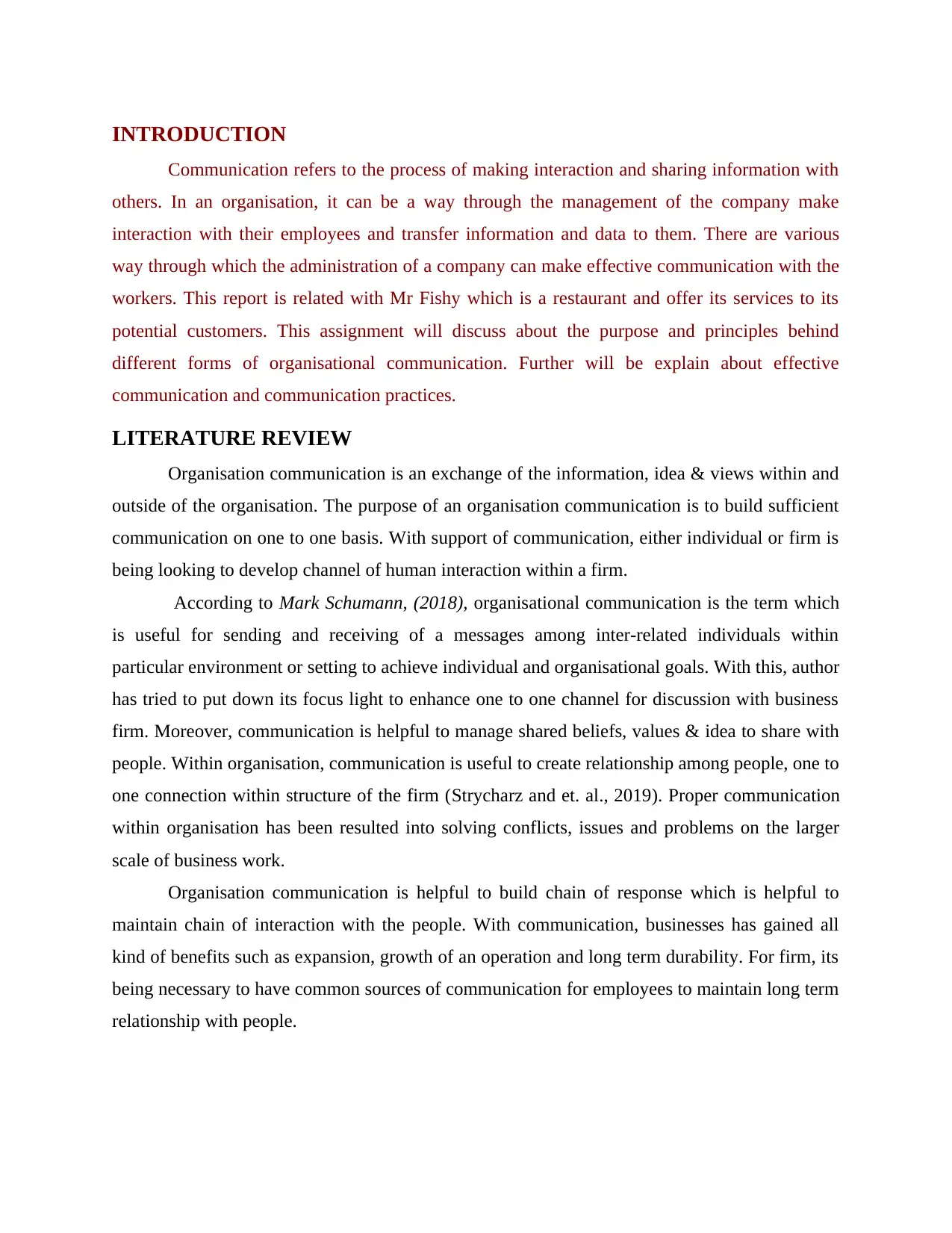
INTRODUCTION
Communication refers to the process of making interaction and sharing information with
others. In an organisation, it can be a way through the management of the company make
interaction with their employees and transfer information and data to them. There are various
way through which the administration of a company can make effective communication with the
workers. This report is related with Mr Fishy which is a restaurant and offer its services to its
potential customers. This assignment will discuss about the purpose and principles behind
different forms of organisational communication. Further will be explain about effective
communication and communication practices.
LITERATURE REVIEW
Organisation communication is an exchange of the information, idea & views within and
outside of the organisation. The purpose of an organisation communication is to build sufficient
communication on one to one basis. With support of communication, either individual or firm is
being looking to develop channel of human interaction within a firm.
According to Mark Schumann, (2018), organisational communication is the term which
is useful for sending and receiving of a messages among inter-related individuals within
particular environment or setting to achieve individual and organisational goals. With this, author
has tried to put down its focus light to enhance one to one channel for discussion with business
firm. Moreover, communication is helpful to manage shared beliefs, values & idea to share with
people. Within organisation, communication is useful to create relationship among people, one to
one connection within structure of the firm (Strycharz and et. al., 2019). Proper communication
within organisation has been resulted into solving conflicts, issues and problems on the larger
scale of business work.
Organisation communication is helpful to build chain of response which is helpful to
maintain chain of interaction with the people. With communication, businesses has gained all
kind of benefits such as expansion, growth of an operation and long term durability. For firm, its
being necessary to have common sources of communication for employees to maintain long term
relationship with people.
Communication refers to the process of making interaction and sharing information with
others. In an organisation, it can be a way through the management of the company make
interaction with their employees and transfer information and data to them. There are various
way through which the administration of a company can make effective communication with the
workers. This report is related with Mr Fishy which is a restaurant and offer its services to its
potential customers. This assignment will discuss about the purpose and principles behind
different forms of organisational communication. Further will be explain about effective
communication and communication practices.
LITERATURE REVIEW
Organisation communication is an exchange of the information, idea & views within and
outside of the organisation. The purpose of an organisation communication is to build sufficient
communication on one to one basis. With support of communication, either individual or firm is
being looking to develop channel of human interaction within a firm.
According to Mark Schumann, (2018), organisational communication is the term which
is useful for sending and receiving of a messages among inter-related individuals within
particular environment or setting to achieve individual and organisational goals. With this, author
has tried to put down its focus light to enhance one to one channel for discussion with business
firm. Moreover, communication is helpful to manage shared beliefs, values & idea to share with
people. Within organisation, communication is useful to create relationship among people, one to
one connection within structure of the firm (Strycharz and et. al., 2019). Proper communication
within organisation has been resulted into solving conflicts, issues and problems on the larger
scale of business work.
Organisation communication is helpful to build chain of response which is helpful to
maintain chain of interaction with the people. With communication, businesses has gained all
kind of benefits such as expansion, growth of an operation and long term durability. For firm, its
being necessary to have common sources of communication for employees to maintain long term
relationship with people.
Paraphrase This Document
Need a fresh take? Get an instant paraphrase of this document with our AI Paraphraser
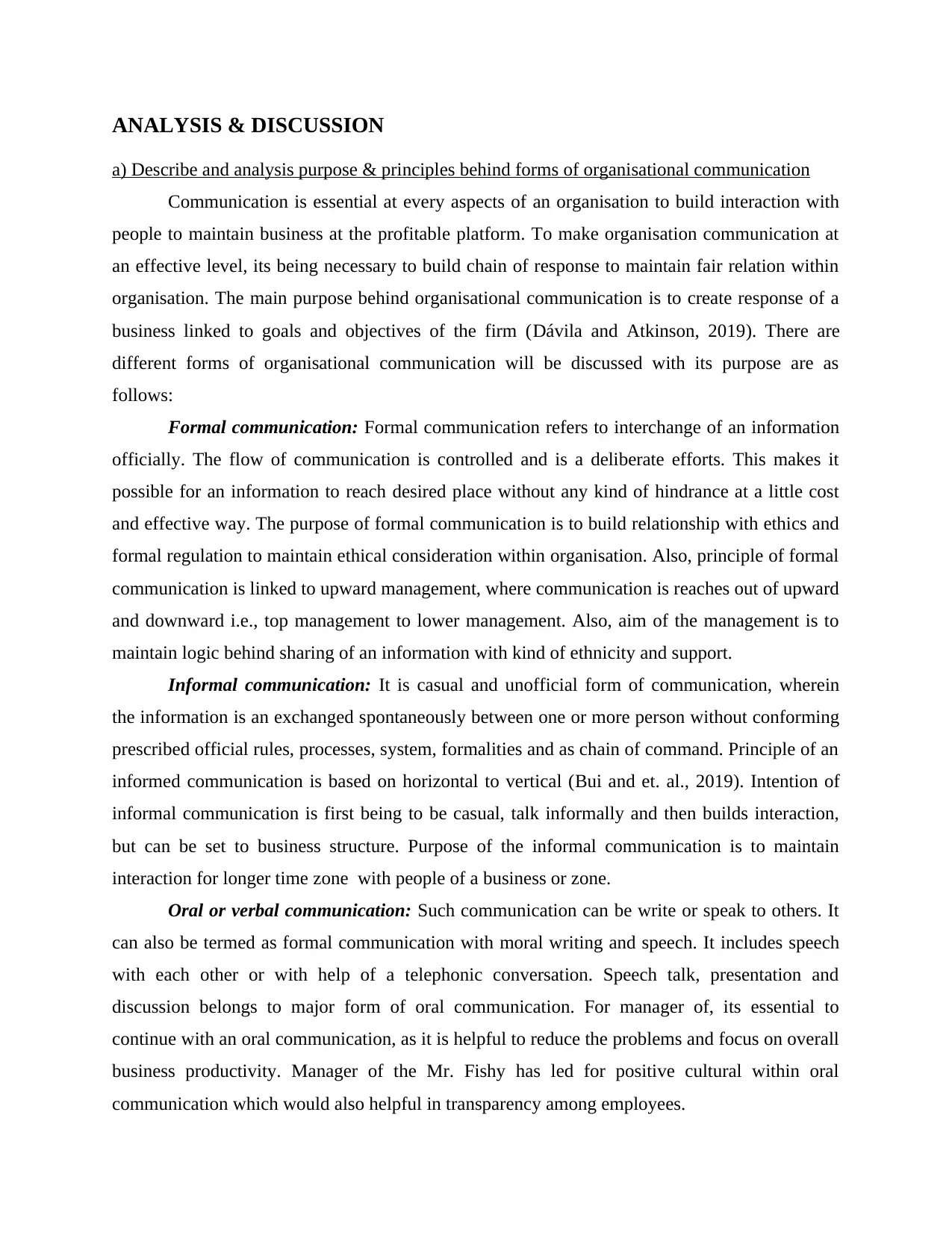
ANALYSIS & DISCUSSION
a) Describe and analysis purpose & principles behind forms of organisational communication
Communication is essential at every aspects of an organisation to build interaction with
people to maintain business at the profitable platform. To make organisation communication at
an effective level, its being necessary to build chain of response to maintain fair relation within
organisation. The main purpose behind organisational communication is to create response of a
business linked to goals and objectives of the firm (Dávila and Atkinson, 2019). There are
different forms of organisational communication will be discussed with its purpose are as
follows:
Formal communication: Formal communication refers to interchange of an information
officially. The flow of communication is controlled and is a deliberate efforts. This makes it
possible for an information to reach desired place without any kind of hindrance at a little cost
and effective way. The purpose of formal communication is to build relationship with ethics and
formal regulation to maintain ethical consideration within organisation. Also, principle of formal
communication is linked to upward management, where communication is reaches out of upward
and downward i.e., top management to lower management. Also, aim of the management is to
maintain logic behind sharing of an information with kind of ethnicity and support.
Informal communication: It is casual and unofficial form of communication, wherein
the information is an exchanged spontaneously between one or more person without conforming
prescribed official rules, processes, system, formalities and as chain of command. Principle of an
informed communication is based on horizontal to vertical (Bui and et. al., 2019). Intention of
informal communication is first being to be casual, talk informally and then builds interaction,
but can be set to business structure. Purpose of the informal communication is to maintain
interaction for longer time zone with people of a business or zone.
Oral or verbal communication: Such communication can be write or speak to others. It
can also be termed as formal communication with moral writing and speech. It includes speech
with each other or with help of a telephonic conversation. Speech talk, presentation and
discussion belongs to major form of oral communication. For manager of, its essential to
continue with an oral communication, as it is helpful to reduce the problems and focus on overall
business productivity. Manager of the Mr. Fishy has led for positive cultural within oral
communication which would also helpful in transparency among employees.
a) Describe and analysis purpose & principles behind forms of organisational communication
Communication is essential at every aspects of an organisation to build interaction with
people to maintain business at the profitable platform. To make organisation communication at
an effective level, its being necessary to build chain of response to maintain fair relation within
organisation. The main purpose behind organisational communication is to create response of a
business linked to goals and objectives of the firm (Dávila and Atkinson, 2019). There are
different forms of organisational communication will be discussed with its purpose are as
follows:
Formal communication: Formal communication refers to interchange of an information
officially. The flow of communication is controlled and is a deliberate efforts. This makes it
possible for an information to reach desired place without any kind of hindrance at a little cost
and effective way. The purpose of formal communication is to build relationship with ethics and
formal regulation to maintain ethical consideration within organisation. Also, principle of formal
communication is linked to upward management, where communication is reaches out of upward
and downward i.e., top management to lower management. Also, aim of the management is to
maintain logic behind sharing of an information with kind of ethnicity and support.
Informal communication: It is casual and unofficial form of communication, wherein
the information is an exchanged spontaneously between one or more person without conforming
prescribed official rules, processes, system, formalities and as chain of command. Principle of an
informed communication is based on horizontal to vertical (Bui and et. al., 2019). Intention of
informal communication is first being to be casual, talk informally and then builds interaction,
but can be set to business structure. Purpose of the informal communication is to maintain
interaction for longer time zone with people of a business or zone.
Oral or verbal communication: Such communication can be write or speak to others. It
can also be termed as formal communication with moral writing and speech. It includes speech
with each other or with help of a telephonic conversation. Speech talk, presentation and
discussion belongs to major form of oral communication. For manager of, its essential to
continue with an oral communication, as it is helpful to reduce the problems and focus on overall
business productivity. Manager of the Mr. Fishy has led for positive cultural within oral
communication which would also helpful in transparency among employees.
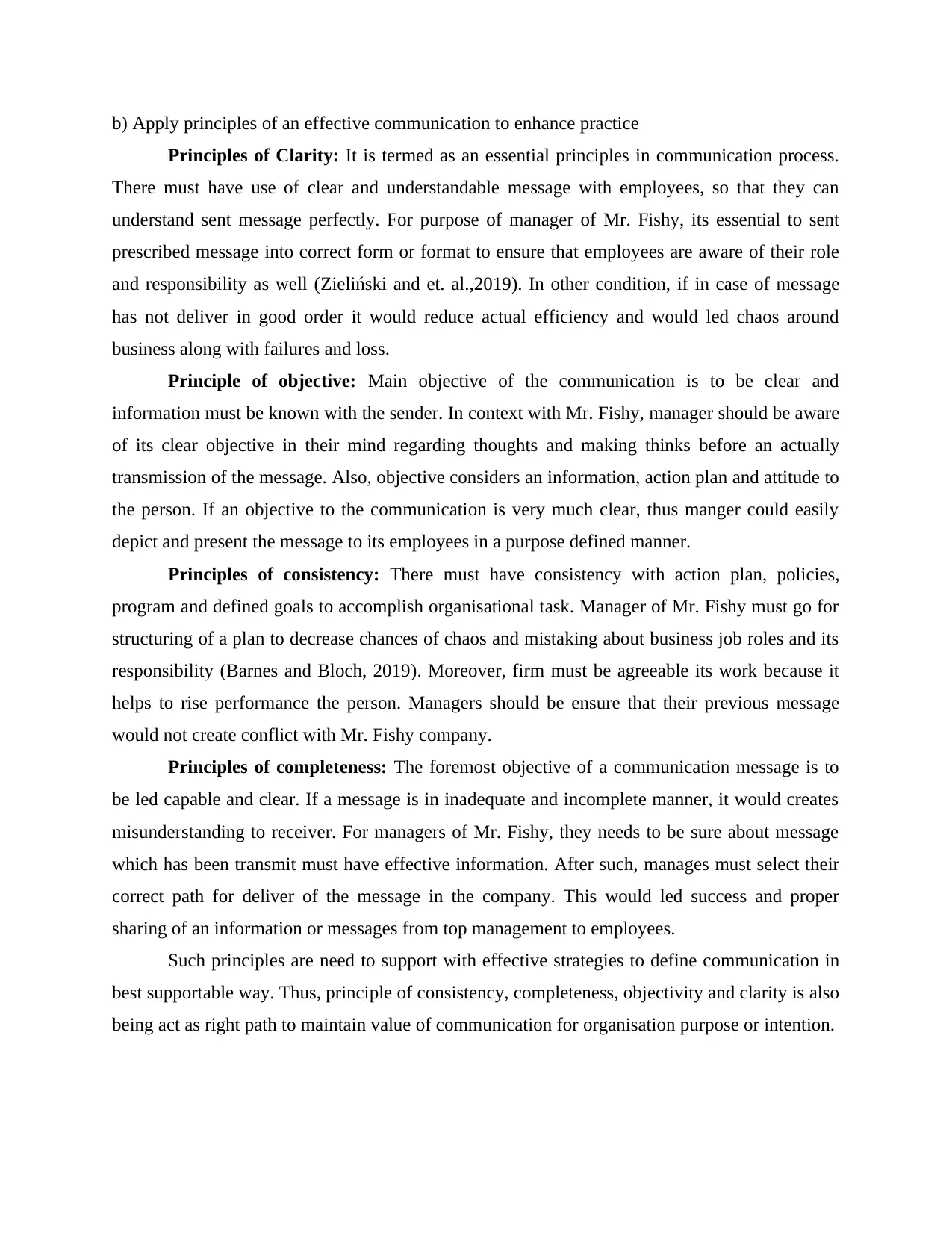
b) Apply principles of an effective communication to enhance practice
Principles of Clarity: It is termed as an essential principles in communication process.
There must have use of clear and understandable message with employees, so that they can
understand sent message perfectly. For purpose of manager of Mr. Fishy, its essential to sent
prescribed message into correct form or format to ensure that employees are aware of their role
and responsibility as well (Zieliński and et. al.,2019). In other condition, if in case of message
has not deliver in good order it would reduce actual efficiency and would led chaos around
business along with failures and loss.
Principle of objective: Main objective of the communication is to be clear and
information must be known with the sender. In context with Mr. Fishy, manager should be aware
of its clear objective in their mind regarding thoughts and making thinks before an actually
transmission of the message. Also, objective considers an information, action plan and attitude to
the person. If an objective to the communication is very much clear, thus manger could easily
depict and present the message to its employees in a purpose defined manner.
Principles of consistency: There must have consistency with action plan, policies,
program and defined goals to accomplish organisational task. Manager of Mr. Fishy must go for
structuring of a plan to decrease chances of chaos and mistaking about business job roles and its
responsibility (Barnes and Bloch, 2019). Moreover, firm must be agreeable its work because it
helps to rise performance the person. Managers should be ensure that their previous message
would not create conflict with Mr. Fishy company.
Principles of completeness: The foremost objective of a communication message is to
be led capable and clear. If a message is in inadequate and incomplete manner, it would creates
misunderstanding to receiver. For managers of Mr. Fishy, they needs to be sure about message
which has been transmit must have effective information. After such, manages must select their
correct path for deliver of the message in the company. This would led success and proper
sharing of an information or messages from top management to employees.
Such principles are need to support with effective strategies to define communication in
best supportable way. Thus, principle of consistency, completeness, objectivity and clarity is also
being act as right path to maintain value of communication for organisation purpose or intention.
Principles of Clarity: It is termed as an essential principles in communication process.
There must have use of clear and understandable message with employees, so that they can
understand sent message perfectly. For purpose of manager of Mr. Fishy, its essential to sent
prescribed message into correct form or format to ensure that employees are aware of their role
and responsibility as well (Zieliński and et. al.,2019). In other condition, if in case of message
has not deliver in good order it would reduce actual efficiency and would led chaos around
business along with failures and loss.
Principle of objective: Main objective of the communication is to be clear and
information must be known with the sender. In context with Mr. Fishy, manager should be aware
of its clear objective in their mind regarding thoughts and making thinks before an actually
transmission of the message. Also, objective considers an information, action plan and attitude to
the person. If an objective to the communication is very much clear, thus manger could easily
depict and present the message to its employees in a purpose defined manner.
Principles of consistency: There must have consistency with action plan, policies,
program and defined goals to accomplish organisational task. Manager of Mr. Fishy must go for
structuring of a plan to decrease chances of chaos and mistaking about business job roles and its
responsibility (Barnes and Bloch, 2019). Moreover, firm must be agreeable its work because it
helps to rise performance the person. Managers should be ensure that their previous message
would not create conflict with Mr. Fishy company.
Principles of completeness: The foremost objective of a communication message is to
be led capable and clear. If a message is in inadequate and incomplete manner, it would creates
misunderstanding to receiver. For managers of Mr. Fishy, they needs to be sure about message
which has been transmit must have effective information. After such, manages must select their
correct path for deliver of the message in the company. This would led success and proper
sharing of an information or messages from top management to employees.
Such principles are need to support with effective strategies to define communication in
best supportable way. Thus, principle of consistency, completeness, objectivity and clarity is also
being act as right path to maintain value of communication for organisation purpose or intention.
⊘ This is a preview!⊘
Do you want full access?
Subscribe today to unlock all pages.

Trusted by 1+ million students worldwide
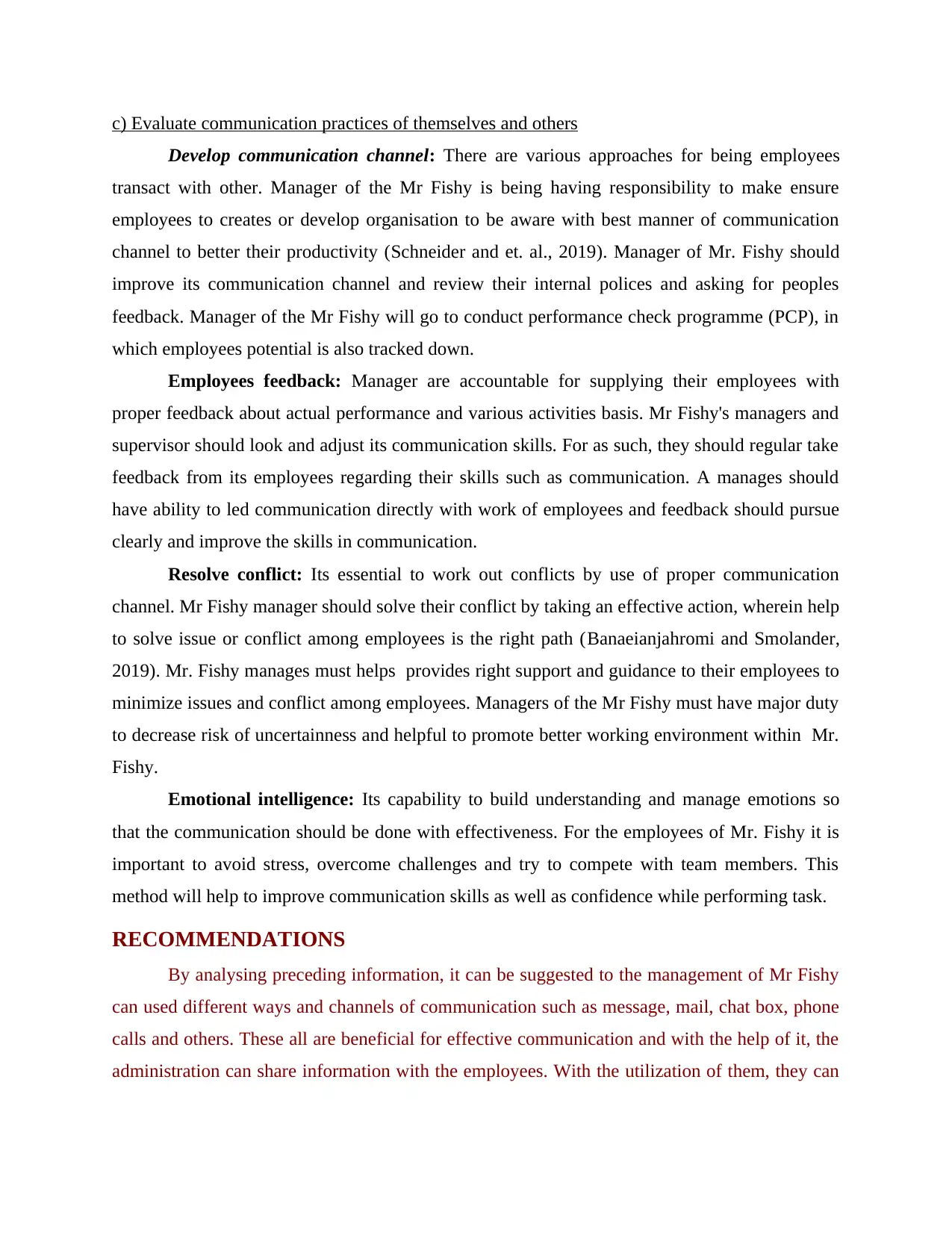
c) Evaluate communication practices of themselves and others
Develop communication channel: There are various approaches for being employees
transact with other. Manager of the Mr Fishy is being having responsibility to make ensure
employees to creates or develop organisation to be aware with best manner of communication
channel to better their productivity (Schneider and et. al., 2019). Manager of Mr. Fishy should
improve its communication channel and review their internal polices and asking for peoples
feedback. Manager of the Mr Fishy will go to conduct performance check programme (PCP), in
which employees potential is also tracked down.
Employees feedback: Manager are accountable for supplying their employees with
proper feedback about actual performance and various activities basis. Mr Fishy's managers and
supervisor should look and adjust its communication skills. For as such, they should regular take
feedback from its employees regarding their skills such as communication. A manages should
have ability to led communication directly with work of employees and feedback should pursue
clearly and improve the skills in communication.
Resolve conflict: Its essential to work out conflicts by use of proper communication
channel. Mr Fishy manager should solve their conflict by taking an effective action, wherein help
to solve issue or conflict among employees is the right path (Banaeianjahromi and Smolander,
2019). Mr. Fishy manages must helps provides right support and guidance to their employees to
minimize issues and conflict among employees. Managers of the Mr Fishy must have major duty
to decrease risk of uncertainness and helpful to promote better working environment within Mr.
Fishy.
Emotional intelligence: Its capability to build understanding and manage emotions so
that the communication should be done with effectiveness. For the employees of Mr. Fishy it is
important to avoid stress, overcome challenges and try to compete with team members. This
method will help to improve communication skills as well as confidence while performing task.
RECOMMENDATIONS
By analysing preceding information, it can be suggested to the management of Mr Fishy
can used different ways and channels of communication such as message, mail, chat box, phone
calls and others. These all are beneficial for effective communication and with the help of it, the
administration can share information with the employees. With the utilization of them, they can
Develop communication channel: There are various approaches for being employees
transact with other. Manager of the Mr Fishy is being having responsibility to make ensure
employees to creates or develop organisation to be aware with best manner of communication
channel to better their productivity (Schneider and et. al., 2019). Manager of Mr. Fishy should
improve its communication channel and review their internal polices and asking for peoples
feedback. Manager of the Mr Fishy will go to conduct performance check programme (PCP), in
which employees potential is also tracked down.
Employees feedback: Manager are accountable for supplying their employees with
proper feedback about actual performance and various activities basis. Mr Fishy's managers and
supervisor should look and adjust its communication skills. For as such, they should regular take
feedback from its employees regarding their skills such as communication. A manages should
have ability to led communication directly with work of employees and feedback should pursue
clearly and improve the skills in communication.
Resolve conflict: Its essential to work out conflicts by use of proper communication
channel. Mr Fishy manager should solve their conflict by taking an effective action, wherein help
to solve issue or conflict among employees is the right path (Banaeianjahromi and Smolander,
2019). Mr. Fishy manages must helps provides right support and guidance to their employees to
minimize issues and conflict among employees. Managers of the Mr Fishy must have major duty
to decrease risk of uncertainness and helpful to promote better working environment within Mr.
Fishy.
Emotional intelligence: Its capability to build understanding and manage emotions so
that the communication should be done with effectiveness. For the employees of Mr. Fishy it is
important to avoid stress, overcome challenges and try to compete with team members. This
method will help to improve communication skills as well as confidence while performing task.
RECOMMENDATIONS
By analysing preceding information, it can be suggested to the management of Mr Fishy
can used different ways and channels of communication such as message, mail, chat box, phone
calls and others. These all are beneficial for effective communication and with the help of it, the
administration can share information with the employees. With the utilization of them, they can
Paraphrase This Document
Need a fresh take? Get an instant paraphrase of this document with our AI Paraphraser
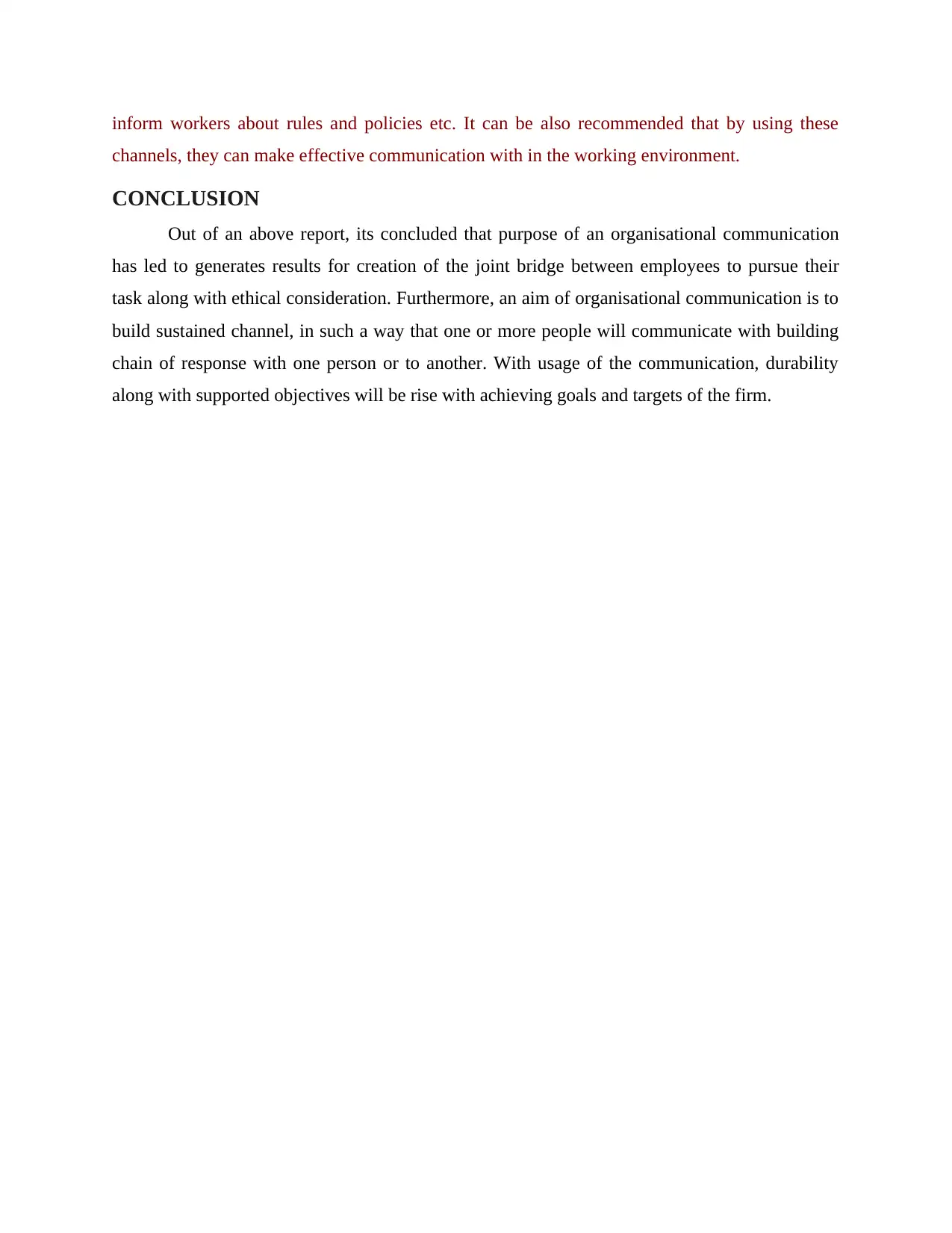
inform workers about rules and policies etc. It can be also recommended that by using these
channels, they can make effective communication with in the working environment.
CONCLUSION
Out of an above report, its concluded that purpose of an organisational communication
has led to generates results for creation of the joint bridge between employees to pursue their
task along with ethical consideration. Furthermore, an aim of organisational communication is to
build sustained channel, in such a way that one or more people will communicate with building
chain of response with one person or to another. With usage of the communication, durability
along with supported objectives will be rise with achieving goals and targets of the firm.
channels, they can make effective communication with in the working environment.
CONCLUSION
Out of an above report, its concluded that purpose of an organisational communication
has led to generates results for creation of the joint bridge between employees to pursue their
task along with ethical consideration. Furthermore, an aim of organisational communication is to
build sustained channel, in such a way that one or more people will communicate with building
chain of response with one person or to another. With usage of the communication, durability
along with supported objectives will be rise with achieving goals and targets of the firm.
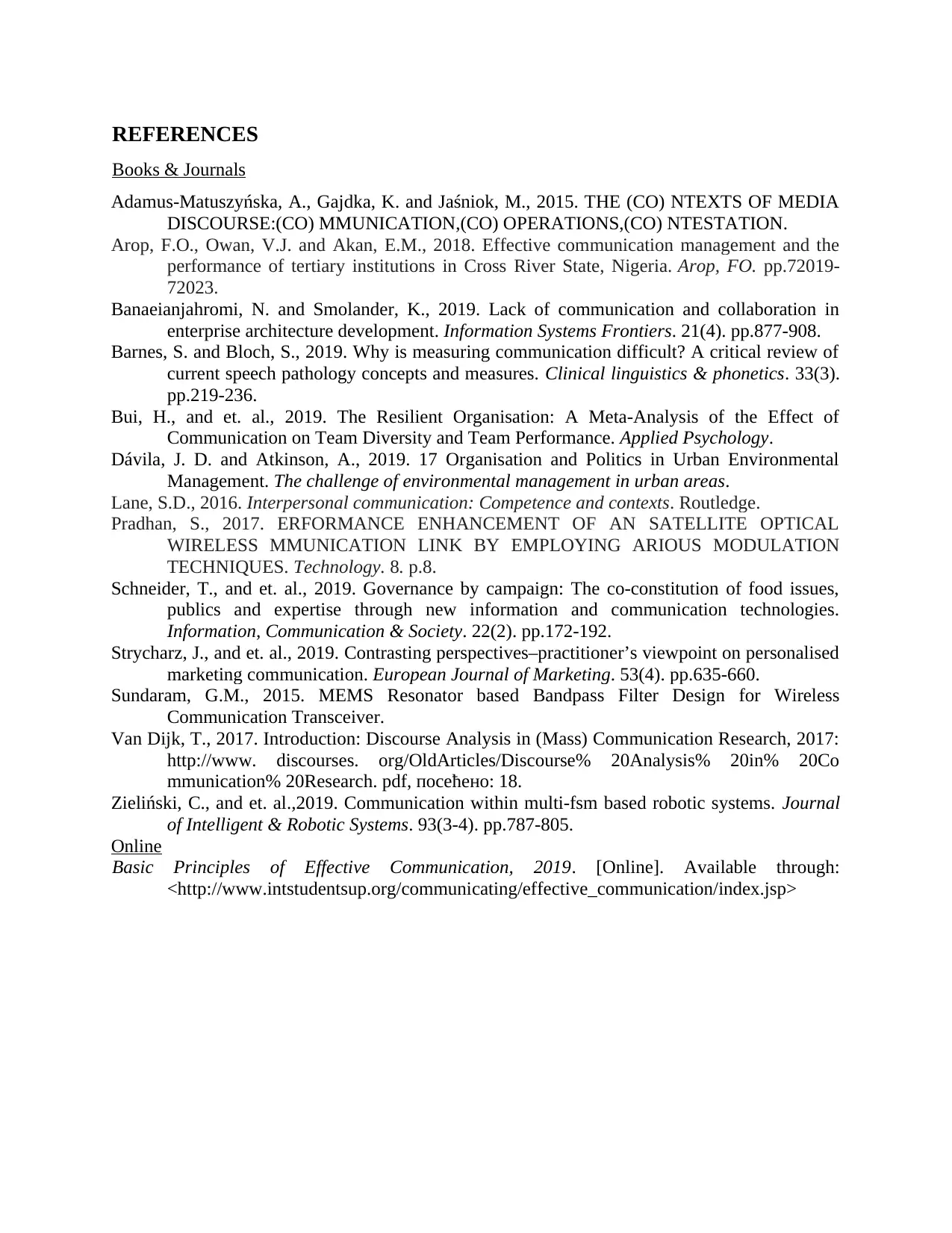
REFERENCES
Books & Journals
Adamus-Matuszyńska, A., Gajdka, K. and Jaśniok, M., 2015. THE (CO) NTEXTS OF MEDIA
DISCOURSE:(CO) MMUNICATION,(CO) OPERATIONS,(CO) NTESTATION.
Arop, F.O., Owan, V.J. and Akan, E.M., 2018. Effective communication management and the
performance of tertiary institutions in Cross River State, Nigeria. Arop, FO. pp.72019-
72023.
Banaeianjahromi, N. and Smolander, K., 2019. Lack of communication and collaboration in
enterprise architecture development. Information Systems Frontiers. 21(4). pp.877-908.
Barnes, S. and Bloch, S., 2019. Why is measuring communication difficult? A critical review of
current speech pathology concepts and measures. Clinical linguistics & phonetics. 33(3).
pp.219-236.
Bui, H., and et. al., 2019. The Resilient Organisation: A Meta‐Analysis of the Effect of
Communication on Team Diversity and Team Performance. Applied Psychology.
Dávila, J. D. and Atkinson, A., 2019. 17 Organisation and Politics in Urban Environmental
Management. The challenge of environmental management in urban areas.
Lane, S.D., 2016. Interpersonal communication: Competence and contexts. Routledge.
Pradhan, S., 2017. ERFORMANCE ENHANCEMENT OF AN SATELLITE OPTICAL
WIRELESS MMUNICATION LINK BY EMPLOYING ARIOUS MODULATION
TECHNIQUES. Technology. 8. p.8.
Schneider, T., and et. al., 2019. Governance by campaign: The co-constitution of food issues,
publics and expertise through new information and communication technologies.
Information, Communication & Society. 22(2). pp.172-192.
Strycharz, J., and et. al., 2019. Contrasting perspectives–practitioner’s viewpoint on personalised
marketing communication. European Journal of Marketing. 53(4). pp.635-660.
Sundaram, G.M., 2015. MEMS Resonator based Bandpass Filter Design for Wireless
Communication Transceiver.
Van Dijk, T., 2017. Introduction: Discourse Analysis in (Mass) Communication Research, 2017:
http://www. discourses. org/OldArticles/Discourse% 20Analysis% 20in% 20Co
mmunication% 20Research. pdf, посећено: 18.
Zieliński, C., and et. al.,2019. Communication within multi-fsm based robotic systems. Journal
of Intelligent & Robotic Systems. 93(3-4). pp.787-805.
Online
Basic Principles of Effective Communication, 2019. [Online]. Available through:
<http://www.intstudentsup.org/communicating/effective_communication/index.jsp>
Books & Journals
Adamus-Matuszyńska, A., Gajdka, K. and Jaśniok, M., 2015. THE (CO) NTEXTS OF MEDIA
DISCOURSE:(CO) MMUNICATION,(CO) OPERATIONS,(CO) NTESTATION.
Arop, F.O., Owan, V.J. and Akan, E.M., 2018. Effective communication management and the
performance of tertiary institutions in Cross River State, Nigeria. Arop, FO. pp.72019-
72023.
Banaeianjahromi, N. and Smolander, K., 2019. Lack of communication and collaboration in
enterprise architecture development. Information Systems Frontiers. 21(4). pp.877-908.
Barnes, S. and Bloch, S., 2019. Why is measuring communication difficult? A critical review of
current speech pathology concepts and measures. Clinical linguistics & phonetics. 33(3).
pp.219-236.
Bui, H., and et. al., 2019. The Resilient Organisation: A Meta‐Analysis of the Effect of
Communication on Team Diversity and Team Performance. Applied Psychology.
Dávila, J. D. and Atkinson, A., 2019. 17 Organisation and Politics in Urban Environmental
Management. The challenge of environmental management in urban areas.
Lane, S.D., 2016. Interpersonal communication: Competence and contexts. Routledge.
Pradhan, S., 2017. ERFORMANCE ENHANCEMENT OF AN SATELLITE OPTICAL
WIRELESS MMUNICATION LINK BY EMPLOYING ARIOUS MODULATION
TECHNIQUES. Technology. 8. p.8.
Schneider, T., and et. al., 2019. Governance by campaign: The co-constitution of food issues,
publics and expertise through new information and communication technologies.
Information, Communication & Society. 22(2). pp.172-192.
Strycharz, J., and et. al., 2019. Contrasting perspectives–practitioner’s viewpoint on personalised
marketing communication. European Journal of Marketing. 53(4). pp.635-660.
Sundaram, G.M., 2015. MEMS Resonator based Bandpass Filter Design for Wireless
Communication Transceiver.
Van Dijk, T., 2017. Introduction: Discourse Analysis in (Mass) Communication Research, 2017:
http://www. discourses. org/OldArticles/Discourse% 20Analysis% 20in% 20Co
mmunication% 20Research. pdf, посећено: 18.
Zieliński, C., and et. al.,2019. Communication within multi-fsm based robotic systems. Journal
of Intelligent & Robotic Systems. 93(3-4). pp.787-805.
Online
Basic Principles of Effective Communication, 2019. [Online]. Available through:
<http://www.intstudentsup.org/communicating/effective_communication/index.jsp>
⊘ This is a preview!⊘
Do you want full access?
Subscribe today to unlock all pages.

Trusted by 1+ million students worldwide
1 out of 9
Related Documents
Your All-in-One AI-Powered Toolkit for Academic Success.
+13062052269
info@desklib.com
Available 24*7 on WhatsApp / Email
![[object Object]](/_next/static/media/star-bottom.7253800d.svg)
Unlock your academic potential
Copyright © 2020–2026 A2Z Services. All Rights Reserved. Developed and managed by ZUCOL.





